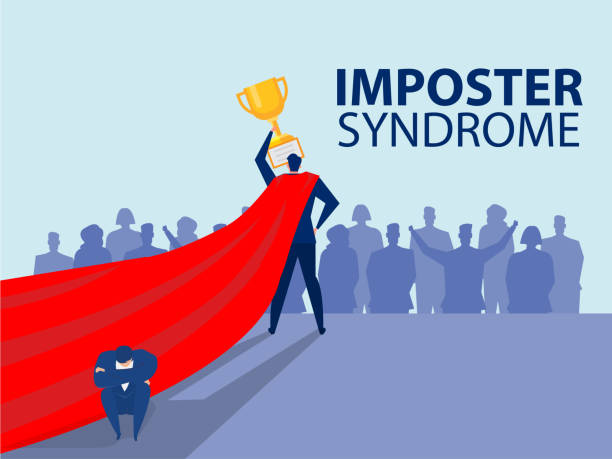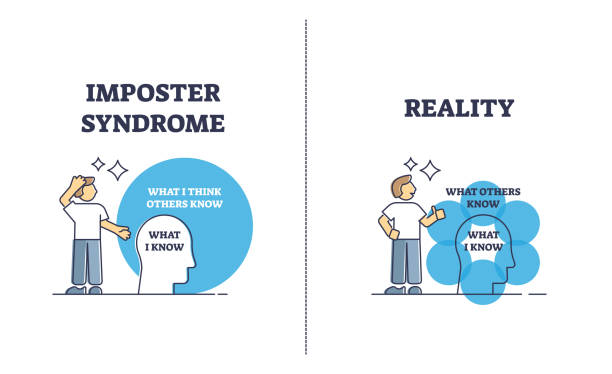If you struggle with Attention Deficit Hyperactivity Disorder (ADHD), life can often feel like an uphill battle. Indeed, many people with ADHD claim that in order to achieve the same things as neurotypical people, they have to work twice as hard and make twice as many mistakes along the way. Dealing with feelings of Imposter Syndrome are among the common challenges those with ADHD face that contribute to these unnecessary mistakes. Such daily challenges arise not from a lack of intelligence or a lack of good intentions. The ADHD brain just works differently than the neurotypical brain. Unfortunately, modern life is designed for the latter.
In addition to having to work harder than the people around them, individuals with ADHD often hide their struggles from the public. This derives from a sense of shame or fear that they might be perceived differently. By keeping parts of themselves hidden, however, people with ADHD often end up exacerbating their feelings of guilt and shame. All of these factors together create the perfect storm for something called “imposter syndrome.” This is the psychological experience of feeling like a phony or imposter in some area of your life. Although it is not an official clinical disorder, the experience of imposter syndrome is very real, and it can lead to low confidence, low self-esteem, and persistent self-doubt.

What Is Imposter Syndrome?
Imposter syndrome is a term coined in the 1970s by clinical psychologists Pauline Clance and Suzanne Imes. It is a condition that causes individuals to feel undeserving of their achievements despite the objective successes in their life. Rather than attributing their accomplishments to internal characteristics (e.g. intelligence, ambition, or grit), people with imposter syndrome believe their successes came from external factors – for instance, good timing or sheer luck. Consequently, they live in constant fear that they will be found out as a fraud.
Of course, people with imposter syndrome are not frauds and do deserve recognition for their hard work and achievements. In fact, those with imposter syndrome are often some of the most well accomplished individuals. They might hold multiple academic degrees or have impressive job titles. But regardless of evidence to the contrary, these individuals do not believe they have earned the right to celebrate their achievements.
Although the feelings that imposter syndrome evokes are unwarranted, they are not uncommon. Most people at some point in their lives will experience anxiety or self-doubt about their competence in a new role. This is because personal growth requires stepping out of one’s comfort zone and facing the learning curves that come with new experiences. However, some individuals have a much harder time letting go of their insecurity and self-doubt. Adults with ADHD in particular often fall into this category.

Imposter Syndrome and ADHD
Research illustrates that imposter syndrome and ADHD are a common pairing. But what is it about ADHD that fuels the experience of imposter syndrome? For starters, having ADHD creates difficulties with organization, time management, and goal-directed behavior. Completing simple daily tasks such as leaving for work on time, paying bills, or finishing assignments is much more challenging for adults with ADHD than for neurotypical adults. As such, people with ADHD often feel they must constantly work twice as hard in order to even meet the standards of neurotypical people.
Endlessly working on overdrive is physically exhausting, but it also takes a psychological toll. People with ADHD often report a deep-seated feeling that they are deficient or inferior compared to those around them. These feelings can lead individuals to develop a negative self-image. Viewing themselves negatively not only prevents them from celebrating their accomplishments, but it leads to the persistent feeling that they are a fraud.
Additionally, feeling deficient can make individuals with ADHD believe they need to hide their struggles from the people around them. They often feel they will be judged, ostracized, or punished for their differences so they go to great lengths to conceal them. For instance, someone with ADHD might consistently get great feedback at work, but secretly work weekends and pull all-nighters to get everything done. They fear that if their boss found out how much harder they have to work, they would be seen as less reliable or capable.
Underlying these fears are usually feelings of guilt and shame. People with ADHD often feel guilty for hiding parts of themselves and ashamed of their challenges and differences. They tend to hold the core belief that they will never be good enough. Even when they do accomplish things, they don’t think they are deserving of praise. All of these feelings and beliefs are highly characteristic of someone with imposter syndrome, as well.
Signs Of Imposter Syndrome
ADHD and imposter syndrome are undoubtedly connected. So how do you know if you truly have imposter syndrome? Below are some signs to look for:
You minimize your success. People with imposter syndrome rarely feel proud of their successes. Rather than attributing their achievements to their own intelligence or hard work, they write off each accomplishment as a fluke. Someone with imposter syndrome will never celebrate their success because they don’t believe they truly deserve it.
You dwell on your failures. In addition to minimizing their successes, people with imposter syndrome will obsess over the things that did not go well. They spend a lot of time and energy focusing on the negative and very little time thinking about their achievements.
You doubt your expertise. Someone with imposter syndrome constantly feels like a fraud in the various roles in their lives. They doubt their competence and abilities despite their education and experience. They might hold the false belief that they must know everything there is to know about a new role before they take it on. They assume that if they are not perfect at the role from the start, they are not deserving of that role.
You constantly seek external validation. Because people with imposter syndrome will not give themselves validation, they often seek it from an external source. They tend to look forward to performance reviews or evaluations, and they might become people pleasers in hopes of gaining more validation. However, hearing praise from others is never enough to change their core negative beliefs about themselves.
You are a perfectionist. As mentioned above, people with imposter syndrome minimize their success and tend to dwell on their failures. In a similar vein, they are often not satisfied with an outcome unless it is absolutely perfect. While perfectionism can sometimes motivate people to do better, constantly trying to attain an ideal standard can cause significant anxiety and distress.

What Can I Do To Overcome Imposter Syndrome?
Name it! The first step to overcoming imposter syndrome is recognizing that you have an issue and then naming it. Think back to when you first started feeling this way. Notice how your body feels when you begin to sense imposter syndrome creeping in. Simply acknowledging the imposter syndrome (and the shame that accompanies it) is a powerful way to shift your mindset. It can help you zoom out and view your thoughts and feelings as subjective, rather than taking them completely at face value.
Challenge and reframe negative beliefs. Naming your problem can also help you identify the negative automatic thoughts that contribute to your imposter syndrome. Think of an automatic thought as your default response to a situation. For instance, when you face a challenge at a new job your automatic thought might be, “This is so hard for me. I should have never been hired.”
Rather than accepting this thought at face value, take a moment to notice your thought and then try to challenge it. Some helpful questions to ask yourself include: Is there substantial evidence for my thought?; Is there evidence that is contrary to my thought?; What is another way this situation could be interpreted from an outside observer?; What would a friend think about the situation?
In addition to disputing your thought, you can also try reframing it in a more positive light. For example, when a challenge arises at work you can instead say to yourself, “This is hard right now, but I am capable of learning.” Practicing thought challenging and reframing can help stop a negative thought in its tracks before it can affect your feelings and behaviors.
Practice positive self-talk. In addition to changing your negative thoughts, it’s important to work on positive self-talk. Practice giving yourself praise for your accomplishments. Celebrate yourself when you do well. Tell yourself “Good job!” It might feel strange at first, but by making positive self-talk a habit, you can begin to shift your perceptions. Your thoughts are powerful conduits to your emotions and your behaviors. Learning to take control over the way you think is vital to making meaningful changes to your self-image.
Externalize your strengths and accomplishments. Because of object permanence and working memory deficits in ADHD, it is often challenging to remember your strengths in the face of adversity. Instead, the default mode takes over and fills your mind with negative thoughts. To combat this, try externalizing your strengths so that you cannot forget them. You can try journaling your achievements or posting positive feedback on your fridge. Doing so will help you celebrate your wins rather than ruminate on your failures.
In Conclusion
ADHD and imposter syndrome are closely linked. Both can have a negative impact on your self-esteem, increase self-doubt, and make you feel undeserving of your accomplishments. This can leave you feeling like an imposter in your own life. However, you can defeat your imposter syndrome by taking control over how you view your thoughts and actively working to celebrate yourself and your achievements.
At the ATTN Center, we offer ADHD-Focused Therapy to help our patients conquer their Imposter Syndrome. Contact us today!
